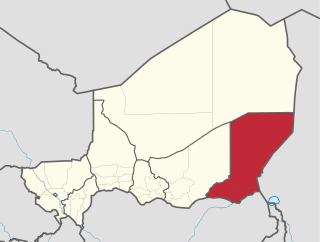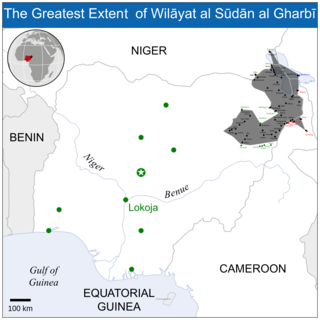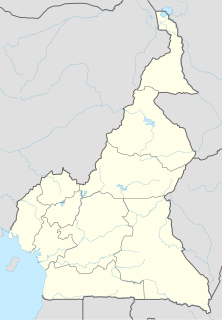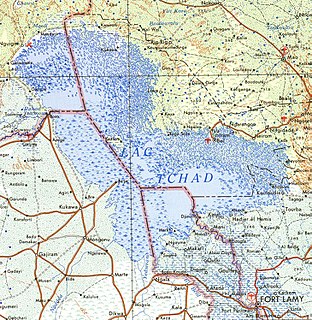Related Research Articles

Diffa is a city and Urban Commune in the extreme southeast of Niger, near the border with Nigeria. It is the administrative seat of both Diffa Region, and the smaller Diffa Department. As of 2011, the commune had a total population of 48,005 people.

Diffa is one of the seven Regions of Niger, located in the southeast of the country. The capital of the region is Diffa.

The Islamic State in West Africa or the Islamic State's West Africa Province, formerly known as Jamā'at Ahl as-Sunnah lid-Da'wah wa'l-Jihād and commonly known as Boko Haram, is a jihadist terrorist organization based in northeastern Nigeria, also active in Chad, Niger and northern Cameroon.
Fotokol is a town and commune in Logone-et-Chari Department, Far North Region, Cameroon. It is home to Fotokol High School.

The Boko Haram insurgency began in 2009, when the jihadist group Boko Haram started an armed rebellion against the government of Nigeria. The conflict takes place within the context of long-standing issues of religious violence between Nigeria's Muslim and Christian communities, and the insurgents' ultimate aim is to establish an Islamic state in the region.
Timeline of the Boko Haram insurgency is the chronology of the Boko Haram insurgency, an ongoing armed conflict between Nigerian Islamist group Boko Haram and the Nigerian government. Boko Haram have carried out many attacks against the military, police and civilians since 2009 - mostly in Nigeria, but also in Cameroon, Chad and Niger.
In 2017, Cameroon hosted a total population of refugees and asylum seekers of approximately 97,400. Of these, 49,300 were from the Central African Republic, 41,600 from Chad, and 2,900 from Nigeria. Kidnappings of Cameroonian citizens by Central African bandits have increased since 2005.

The 2015 Baga massacre was a series of mass killings carried out by the Boko Haram terrorist group in the north-eastern Nigerian town of Baga and its environs, in the state of Borno, between 3 January and 7 January 2015.

The Multinational Joint Task Force (MNJTF) is a combined multinational formation, comprising units, mostly military, from Benin, Cameroon, Chad, Niger, and Nigeria. It is headquartered in N'Djamena and is mandated to bring an end to the Boko Haram insurgency.
The following lists events that happened during 2015 in Niger.

The 2015 Niger raid was an unsuccessful assault on the Nigerien towns Bosso and Diffa, perpetrated by Boko Haram. The incident occurred on 6 February 2015, marking the first major Boko Haram incursion into Niger.

Starting in late January 2015, a coalition of West African troops launched an offensive against the Boko Haram insurgents in Nigeria.
The 2015 Fotokol attack occurred on 4 and 5 February 2015 when Boko Haram militants reportedly killed at least 91 people by shooting and burning, and injured over 500 in Fotokol, Cameroon. The militants, who are based in northeastern Nigeria and active in Chad, Niger and northern Cameroon, also torched mosques and churches of the town. This attack came a day after the regional forces said it had driven Boko Haram from Gambaru, a Nigerian town close by. This was the second foreign country attack by the militants in 2015. This region of Niger is an area where refugees had arrived by the thousands seeking safety from Boko Haram attacks.

Rann is a town in Borno State, Nigeria, adjacent to the border with Cameroon. It was home to a camp for internally displaced people.
Nigerian refugees in Niger are people from Nigeria but taking refuge in Niger. This is predominantly as a result of the Boko haram insurgency in North-Eastern Nigeria. As of July 2016, there are 280,000 refugees in Diffa region of Niger and approximately 6,000 and 10,000 displaced persons in refugee camp of Sayam Forage and Kabelawa respectively.

Bodo is a village in the Far North Region of Cameroon, adjacent to the border with Nigeria.

The Chad Basin campaign of 2018–2020 was a series of battles and offensives in the southern Chad Basin, particularly northeastern Nigeria, which took place amid the ongoing Boko Haram insurgency. The Chad Basin witnessed an upsurge of insurgent activity from early November 2018, as rebels belonging to the Islamic State's West Africa Province (ISWAP) and Boko Haram launched offensives and several raids to regain military strength and seize territory in a renewed attempt to establish an Islamic state in the region. These attacks, especially those by ISWAP, met with considerable success and resulted in the displacement of hundreds of thousands of civilians. The member states of the Multinational Joint Task Force (MJTF), namely Nigeria, Niger, Chad, and Cameroon responded to the increased insurgent activity with counter-offensives. These operations repulsed the rebels in many areas, but failed to fully contain the insurgency.

Goura is a village in the Far North Region of Cameroon. It lies in a "dusty grey sun-bleached plain".

The Niger–Nigeria border is 1,608 km in length and runs from the tripoint with Benin in the west to the tripoint with Chad in the east.

The Nguetchewe attack occurred on 2 August 2020 in Nguetchewe, a village in Far North Region, Cameroon. At least 16 people were killed and another 7 were injured in the grenade attack by Boko Haram.
References
- ↑ Damon, Arwa (2014-06-11). "Where are Nigeria's missing girls? On the hunt for Boko Haram". CNN.com. Retrieved 2014-06-12.
- ↑ "Refugee influx causes unease in Cameroon". IRIN Africa. 2013-10-30. Retrieved 2014-06-12.
| This Nigeria-related article is a stub. You can help Wikipedia by expanding it. |